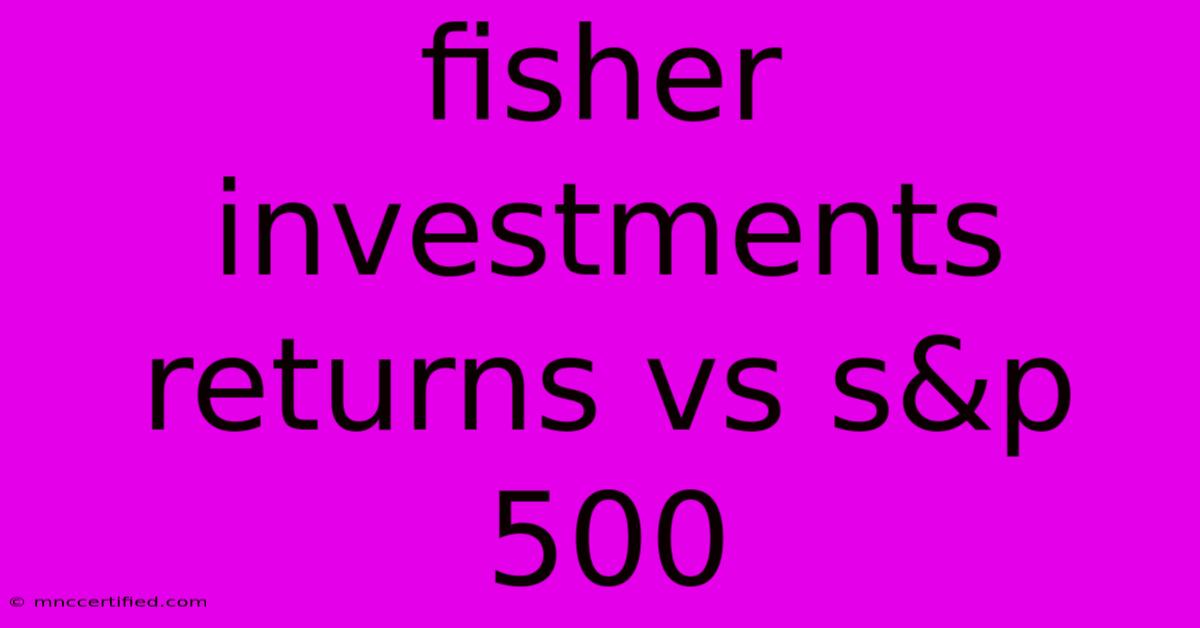Fisher Investments Returns Vs S&p 500

Table of Contents
Fisher Investments vs. S&P 500: A Deep Dive into Returns
For investors, choosing the right path to wealth is crucial. Two popular options often come up in conversations: Fisher Investments and the S&P 500. While both offer exposure to the stock market, understanding their performance and differences is essential for making informed decisions.
Understanding the Players
Fisher Investments: A prominent investment management firm founded by Ken Fisher, they offer various investment strategies across different asset classes, including stocks, bonds, and real estate. They are known for their active management approach, aiming to outperform market benchmarks like the S&P 500.
S&P 500: This index tracks the performance of 500 large-cap U.S. companies, representing approximately 80% of the total market capitalization of the U.S. stock market. It's a broad-based index, often considered a proxy for the overall performance of the U.S. stock market.
Comparing Returns: A Deeper Look
The Key Question: Does Fisher Investments outperform the S&P 500?
The Answer: It's not a straightforward yes or no. While Fisher Investments boasts impressive returns in certain periods, it's important to consider the following:
- Performance Variability: Like any investment strategy, Fisher Investments' performance can fluctuate. While they have outperformed the S&P 500 in some years, they have also lagged behind in others.
- Fees and Expenses: Active management strategies, like those employed by Fisher Investments, typically come with higher fees than passively managed index funds that track the S&P 500. These fees can eat into overall returns.
- Time Horizon: Long-term investment horizons are essential for assessing performance. While Fisher Investments may outperform the S&P 500 in the short term, it's crucial to evaluate their performance over extended periods.
Examining Performance Data
While Fisher Investments doesn't publicly disclose the performance of its individual portfolios, some data points provide insights:
- Morningstar: This independent research firm analyzes mutual funds and investment strategies. While their data may not be entirely reflective of all Fisher Investments' offerings, it provides some benchmarks.
- Past Performance is Not Indicative of Future Results: It's crucial to understand that past performance is not a guarantee of future returns. Market conditions and investment strategies can change dramatically over time.
The Importance of Risk and Investment Philosophy
- Risk Tolerance: Fisher Investments' active management approach might carry higher risk compared to the passive investing strategy of simply tracking the S&P 500.
- Investment Goals: A clear understanding of your investment goals and risk tolerance is essential before making any investment decisions.
Conclusion: Choosing the Right Path
There is no single right answer to whether Fisher Investments is better than the S&P 500. It ultimately depends on individual circumstances, risk tolerance, and investment goals.
- For Investors Seeking Active Management: Fisher Investments may be a viable option, but it's crucial to understand the associated fees and potential for higher risk.
- For Investors Preferring a Passive Approach: The S&P 500 offers a diversified and cost-effective way to invest in the U.S. stock market.
Before making any investment decisions, it's vital to consult with a qualified financial advisor who can guide you based on your unique circumstances.

Thank you for visiting our website wich cover about Fisher Investments Returns Vs S&p 500. We hope the information provided has been useful to you. Feel free to contact us if you have any questions or need further assistance. See you next time and dont miss to bookmark.
Featured Posts
-
Union Security Life Insurance Company
Nov 10, 2024
-
What Does Rescinded Mean In Insurance
Nov 10, 2024
-
Commercial Property Insurance Florida
Nov 10, 2024
-
Lord Of The Rings Trading Cards Value
Nov 10, 2024
-
Brighton Vs Man City Live Premier League Match Updates
Nov 10, 2024